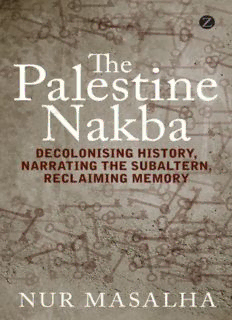
Palestine Nakba : Decolonising History, Narrating the Subaltern, Reclaiming Memory PDF
Preview Palestine Nakba : Decolonising History, Narrating the Subaltern, Reclaiming Memory
The Palestine Nakba About the Author Nur Masalha is Professor of Religion and Politics and director of the Centre for Religion and History at St Mary’s University College, UK. He is also editor of Holy Land Studies: A Multidisciplinary Journal (Edinburgh University Press). The Palestine Nakba Decolonising History, Narrating the Subaltern, Reclaiming Memory nur masalha zEd booKS London & New York The Palestine Nakba:� ���eee������lll���nnniiisssiiinnn������ ���iiisssttt��������������� NNNaaa������aaatttiiinnn������ ttthhheee Subalte�n�� Re�laimin�� Mem��� was first published in 2012 by Zed Books Ltd, 7 Cynthia Street, London n1 9jf, uk and Room 400, 175 Fifth Avenue, New York, ny 10010, usa www.zedbooks.co.uk Copyright © Nur Masalha 2012 The right of NNuurr MMaassaallhhaa tttooo bbbeee iiidddeeennntttiiifififieeeddd aaasss ttthhheee aaauuuttthhhooorrr of this work has been asserted by him in accordance with the Copyright, Designs and Patents Act, 1988 Designed and typeset by illuminati, Grosmont in ITC Bodoni Twelve Index by John Barker Cover designed by www.alice-marwick.co.uk All rights reserved. No part of this publication may be reproduced, stored in a retrieval system or transmitted in any form or by any means, electronic, mechanical, photocopying or otherwise, without the prior permission of Zed Books Ltd. A catalogue record for this book is available from the British Library Library of Congress Cataloging in Publication Data available isbn 978 1 84813 972 5 eb Contents acknowledgements vi Introduction 1 1 zionism and European Settler-Colonialism 19 2 The Memoricide of the Nakba: zionist-Hebrew Toponymy and the de-Arabisation of Palestine 88 3 Fashioning a European Landscape, Erasure and Amnesia: The Jewish National Fund, Afforestation and Green-washing the Nakba 120 4 Appropriating History: Looting of Palestinian Records, Archives and Library Collections, 1948–2011 135 5 Post-zionism, the Liberal Coloniser and Hegemonic Narratives: A Critique of the Israeli ‘New Historians’ 148 6 decolonising History and Narrating the Subaltern: Palestinian oral History, Indigenous and Gendered Memories 205 7 Resisting Memoricide, Reclaiming Memory: Nakba Commemoration among Palestinians in Israel 229 Epilogue: The Continuity of Trauma 251 references 258 index 279 Acknowledgements This book could not have been written without the intellectual and emotional support of my family and friends. First, I would like to thank the many friends and colleagues who have encouraged me over the years and help me, directly and indirectly, with ideas, conversations, criticism, material, logistics and moral support, including Ahmad Sa’di, Sherna berger Gluck, Ilan Pappé, Isabelle Humphries, oren ben-dor, Mary Grey, John docker, duncan Macpherson, Claire Norton, Mark donnelly, Ghada Karmi, Isma‘el Abu-Sa‘ad, Seif d’ana, david Evans, Sari Hanafi, Saad Chedid, Keith Hammond, As’ad Ghanem, Abbas Shiblak, Ronit Lentin, Haim bresheeth, Rahela Mizrahi, bernard Regan, Colin South and Sam Kuruvilla. At zed books I am particularly indebted to editors Jakob Horstmann and Tamsine o’Riordan for their comments and practical help. Last but not least, I owe enormous gratitude to my wife dr Stephanie Cronin, a highly original historian of the modern Middle East, and my daughter Maryam Masalha for their tremendous enthusiasm and emotional support. Stephanie, in particular, helped me with brilliant ideas and sharp comments without which this volume would not have been completed. Any credit for this book should be shared with Stephanie and the people above, but all shortcomings are mine alone. Introduction 1948 was the year of the Palestine Nakba (Catastrophe), the uprooting of the Palestinians and the dismemberment and de- Arabisation of historic Palestine. In the course of the 1948 war and immediate post-Nakba period the name ‘Palestine’ was wiped off the map. In 2012 Palestinians commemorate the 64th anniversary of the Nakba, which is a key date in Palestinian collective memory and the most traumatic event in the history of the Palestinian people. The rupture of 1948 and the ethnic cleansing of Palestine are central to both the Palestinian society of today and Palestinian social history and collective identity. Resisting ethnic cleansing and politicide has been a key feature of the modern history of the Palestinians as a people. In Politicide: Sharon’s War against the Palestinians (2003), Israeli sociologist baruch Kimmerling (1939–2007) defines the ‘politicide’ of the Palestinian people as the gradual but systematic attempt to cause their annihilation: ‘the dissolution of the Palestinian people’s existence as a legitimate social, political and economic entity’. Politicide, Kimmerling asserts, has been present throughout zionism’s struggle with the Palestinians before, during and after the 1948 Nakba. Politicide also epitomised the settler-colonial policies and actions of General Ariel Sharon against the Palestinians. Kimmerling writes:
Description: